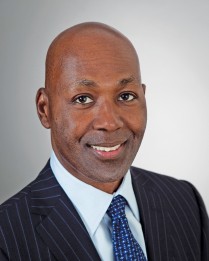NEW YORK CITY
Alumni Affairs and Development expands to the Northeast corridor

Claude Johnson, assistant vice president for Alumni Affairs and Development-New York City. See larger image
More Cornellians live in the metropolitan New York City area or along the Northeast corridor than anywhere else in the world. Many additional Cornellians use New York City as a base or gateway for their business or professional activities.
To better reach them, the Division of Alumni Affairs and Development (AAD) is reinvigorating and expanding the scope of its New York City office. It aims to offer more networking and professional programs for alumni where they live and work and direct additional efforts toward the base of Cornellians in that region.
"With such a large concentration of alumni along that corridor, we want to bring Cornell to them," says Pat Watson '83, AAD's senior associate vice president. "We often tell our young graduates that they are Cornellians for life. Now we want to show them and our seasoned alumni more ways they can benefit and stay involved."
To lead the effort, AAD has hired Claude Johnson to fill the new position of assistant vice president. Johnson most recently was senior director of Northwestern University's New York regional office, and previously he was assistant dean for alumni affairs and development at Cornell's College of Veterinary Medicine, 2003-05. He began his new position April 5.
Johnson will identify new ways to accelerate and support programs and fundraising from Washington, D.C., to Boston. He will oversee new initiatives, which concentrate on connecting Cornellians who work in finance and related industries, and he will help Cornellians tap into the wealth of opportunities afforded by the proximity of Ithaca to Manhattan.
In addition to the Weill Cornell Medical College and its Graduate School of Medical Sciences, Cornell-affiliated offices and programs include Human Ecology, Cornell Cooperative Extension-New York City, the ILR School, the Johnson School, the College of Architecture, Art and Planning, and the College of Engineering's School of Operations Research and Information Engineering.
"A number of Cornell students, faculty, alumni, friends and parents live, work or travel along the Northeast corridor to Boston, New York, Philadelphia and Washington. With so many wonderful resources and Cornellians, we have the opportunity to be extremely creative about how we reach out and engage individuals and families -- developing programs that are intellectually stimulating and relevant," says Johnson.
He also will use New York City as a base for fundraising, adding more major gift officers to his staff over the next six to 12 months.
"One of the things about Cornell is that it is a household name as a brand. But at the same time, much remains to be done in reaching out to individuals and creating opportunities for them to participate in all Cornell has to offer," Johnson says.